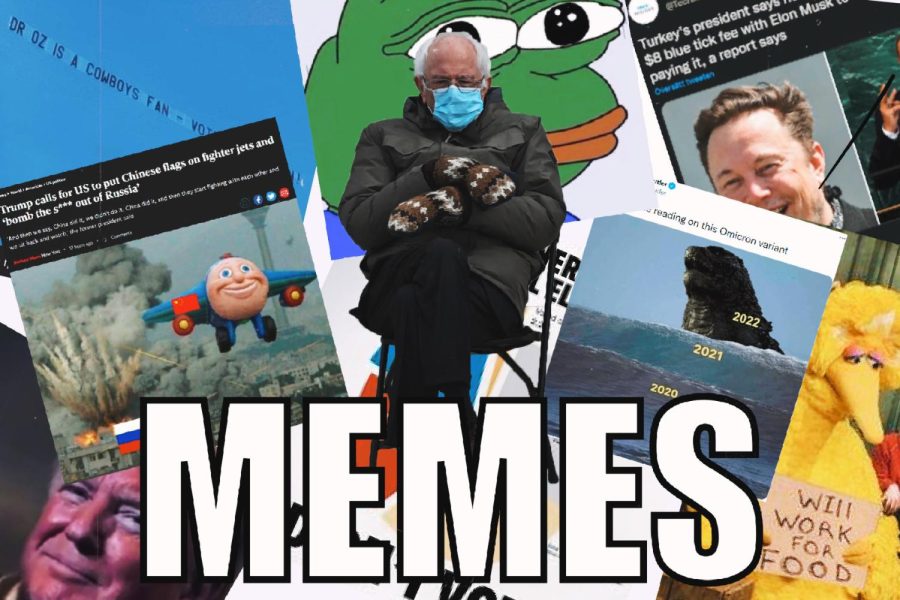A memes to an end
Investigating the influence of Internet humor on politics
Vermont Sen. Bernie Sanders sitting in a chair during the 2021 presidential inauguration was a “cultural reset,” according to Wired – one of millions of memes the Internet has produced since its inception.
November 5, 2022
Ukraine’s official Twitter account posted this political cartoon on Feb. 23, shortly after the first explosions were heard in Russia’s now eight-months-long invasion of Ukraine. The tweet has racked up 1.7 million likes, a testament to the success of what University of California information studies professor Ravan Srinivasan calls Ukraine’s “propagandist media wing” — a meme war that uses humor to bolster support.
The Internet’s reaction to the cartoon reflects the multifaceted yet increasingly significant effect on politics and current events, which Social Studies Department Lead Bonnie Belshe attributes to their simplicity.
“There’s a reason that memes will go viral and get millions of shares and likes and views – because it’s pithy, short, understandable and digestible,” Belshe said. “I wouldn’t say it’s necessarily about information sharing, rather than the emotional manipulation that goes along with any kind of political discourse.”
The term “meme” was first coined in 1976 and has since evolved to become a ubiquitous aspect of the Internet that encompasses a variety of jokes, from captioned images to pranks using certain songs as the punchline. When it comes to memes about current events, junior Matthew Settles believes compressing a situation into a funny image accomplishes more than giving people a laugh.
“[Memes] can get information around really fast and can help people understand things in a more simplified way,” Settles said. “Humor is a way to move information across and help people process [situations].”
Senior Andrew Smithwick, who runs an Instagram account dedicated to sharing political memes, adds that glancing at a meme is more convenient than reading a news article.
“[Memes are] certainly becoming more of an effective method and more widely used as social media becomes more used for spreading news,” Smithwick said. “That’s been the case for over a decade now [after] the advent of Facebook.”
In the context of politics, Belshe explains that the intent and messaging behind memes is nothing new. Instead, she says memes are “the current use of political cartoons and [a] mockery of current events that has been around for centuries.” Google Trends reveals that the search term’s popularity exploded in 2016, partly because of the rampage of Donald Trump compilations that flooded social media during the presidential election season.
The current political landscape remains an open target for meme makers. A parody of Trump and Joe Biden in Minecraft, published a year ago, now sits at a staggering 53 million views on YouTube. These short-form videos have little information value, but Settles says such tidbits of Internet humor can be interpreted from an entirely different perspective.
“It depends on who you’re targeting and what the exact message of the meme is, but memes could be effective at demeaning political figures,” Settles said. “It’s always important to be critical of political figures, but [memes] can also spread misinformation.”
Despite this, the usage of memes in campaigns and movements has established itself as a legitimate political strategy. In the 2022 race for Pennsylvania’s Senate seat, Democratic candidate John Fetterman launched a relentless trolling campaign against his rival Mehmet Oz. Trump was known for occasionally retweeting outlandish political memes from fan accounts. Memes have even been investigated for their roles in multiple violent attacks and frequent weaponization by alt-right extremists on platforms like 4chan.
Settles believes memes are particularly effective within communities of people who find them relatable and warns against approaching them as reliable sources of information. However, even though “[making] people laugh and [making] fun of society and the Internet” are Smithwick’s main reasons for sharing memes, he also gets most of his news through memes and feels that what he posts “adequately describes [his] opinions.”
“[People can] look at [memes] through a lens of ‘haha funny,’ or [approach them with a] more critical lens,” Smithwick said. “That’s always important. But oftentimes, memes can spread the truth.”
Belshe agrees — though she is all for using humor to disseminate information, she advises viewers to consider the intent behind memes with the “same critical lens we want with consuming any media.”
“The whole purpose of the meme is to get a message, an image out there, whether it is for mocking [or] humorous purposes,” Belshe said. “What can be positive is if that’s followed up with learning, with critical thinking. That’s the piece that we need to make sure is there with it.”



















